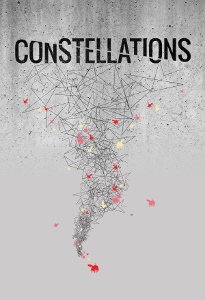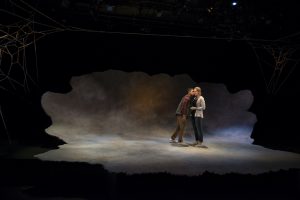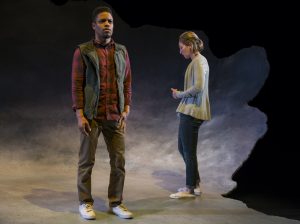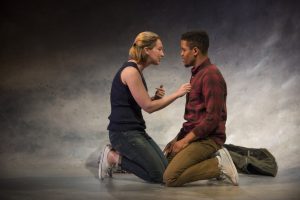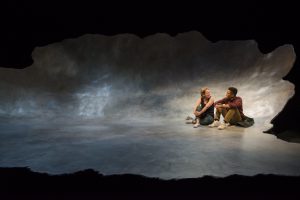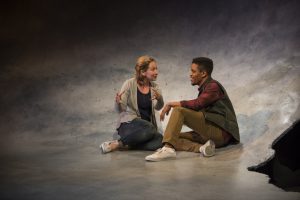CAPTIVATING VARIATIONS ON A THEME OF LOVE
What a feat happens seven times a week in Steppenwolf’s upstairs theater! Usually critics tell you to take their words for what they saw–but this show must be seen to be believed. In only 75 minutes British playwright Nick Payne’s Constellations explores a myriad of possibilities between two persons. The shifting partners create contrasting or complimentary constellations, not solitary stars. They’re always in tandem, each defining itself by the other. Or they’re moons circling an unseen planet, orbiting together by gravitation or following diverse and unpredictable trajectories.
Joe Schermoly’s set suggests a huge opalescent clamshell surrounded by neon spiderwebs (or neural synapses). They crackle with static lightning at every permutation of this fluid one-act. Jonathan Berry’s whiplash staging does the rest, shaping a barrage of tiny vignettes that link and break up two would-be or once and future or past friends or lovers. “Or” is the key word for this shape-shifting show.
Jon Michael Hill is Roland, a bee keeper, and Jessie Fisher is Marianne, a theoretical physicist. Other than the actors’ forms and faces, those are the only fixed realities in Payne’s awesome onslaught of alternatives. The hundred hookups that ensue pursue possible parallels in an ever-evolving relationship. Employing string theory and atomic perspectives, early on Marianne establishes the philosophical backdrop for the constant change that makes this a “play” in every sense: She postulates a “multiverse” where particles behave differently from objects obeying Newtonian laws of physics. Here the past is always present in the future. Anything and everything transpires at this endlessly mutable level. What we assume is actual is only the happenstance of a very malleable moment.
But there’s method in this madness. This is not just free-form artistic anarchy or repetition for effect. However similar the scenes seem (Groundhog Day springs to mind), they follow an arc that comes full circle at the very end. Payne constructs a stream of themes and variations (streams of consciousness too) on pickups and breakups, refusals and proposals, moving in and moving out, aphasia and eloquence, living and dying, free will and contingency, jealousy and loyalty, sex and solitude, love and friendship. No determined destiny manifests itself here, just chance and passion: As Heraclitus said, comparing time to water, “You can never step into the same river twice.” Constellations never quite repeats itself, keeping freedom in formula.
Their first meeting–at a party–soon dissolves into the transience of time, so many random encounters that yield different futures. A ballroom class becomes the proverbial past that’s prologue. At times (as always) Marianne finds herself haunted by her dying mother, “not scared of death as much being kept alive.” She will taste her mortality as well, and their talk will be truncated, at one point done only in sign language. Roland will use the different ranks of bees within a colony as a metaphor: Unlike workers, drones and even the queen, he will find a purpose despite life’s daunting determination to have its way, not ours.
No cold-blooded experiment in alternate realities, Constellations can be strangely funny and deeply moving, despite Payne’s sparkling pinwheel of hit-and-run mini-episodes. Apart from the massive task of memorization in a set order and remembering the proper placement for each “mark” and sound and light cue, Fisher and Hill must handle the play’s British accents and the scenes’ various changes of emphasis—both vocal and physical–in seemingly identical “duets.” It’s a tour de tout, this feast of snippets that astonish us with an emotional variability to match Darwin’s grasp of evolution’s potentials.
Above all, this Steppenwolf stunner with its multi-layered magic forbids us to confuse what is with what must be or to assume that a lifetime has limits. Like Thornton Wilder’s similarly playful Our Town, Constellations puts everything in flux, just as it actually is. We deny an unfinished and infinite universe at our peril.
Constellations
Steppenwolf Theatre Company
Steppenwolf’s Upstairs Theatre
1650 N Halsted St
ends on July 3, 2016
for tickets, call 312.335.1650 or visit Steppenwolf
for more shows, visit Theatre in Chicago
